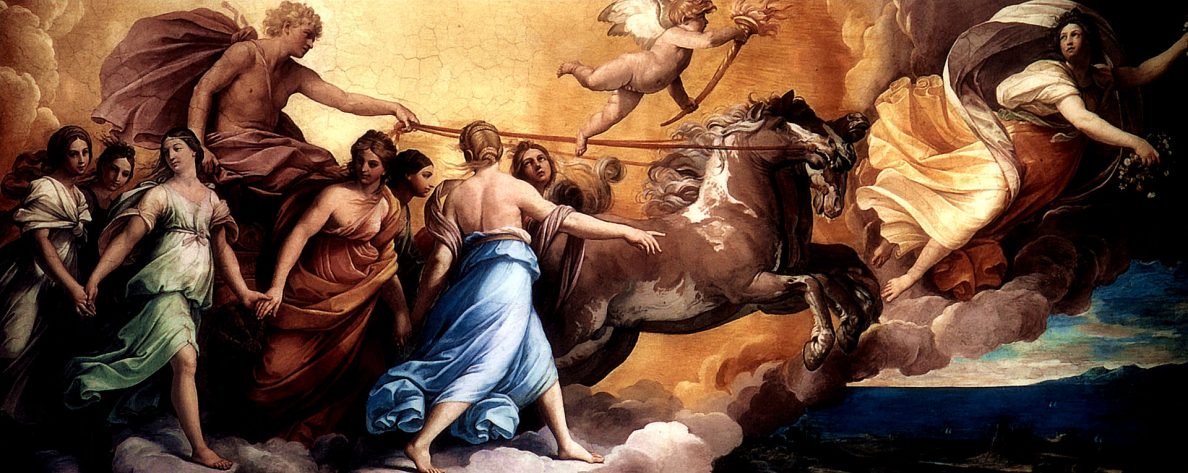The Treasury’s celebration of Thargelia 2016, falls upon April 14th.
Thargelia is one celebration of the birth of the Hellenic God, Apollon, who, under His epithets of Paian (Healer), Katharsios (Purifier) and Apotropaios (Averter), possesses the greatest healing, purificatory and banishing skills within the Hellenic Pantheon. It is a festival in which the first ripe fruits of springtime are offered to Him, for His favor, and in which He offers katharmos (purification) to the City and its inhabitance.
This purification comes in the form of a community feast, followed by the ritual exile of two pharmakoi (singular – pharmakos) or “scapegoats”, who in antiquity would have been persons, one male and one female, specially chosen for this task. In modern times, it is more efficient and humane to produce effigies to represent these scapegoats. The effigies can then be “driven out” by way of ritual fire or burial, thus ensuring effective purification.
During the Thargelia ritual, participants will energetically release their ills, and will also air their grievances against the City leaders and others of high position who fail to recognize the City’s needs, by speaking them (optional) and writing them (mandatory) with intent upon small bits of paper. These papers should then be stuffed into, or otherwise attached to, the pharmakoi effigies, which will be adorned with flowers by the facilitator and placed on the ends of the ritual feast table residing in front of the altar. Then, the pre-ritual khernips purification will begin, and all participants and viewers will rinse their faces and hands to prepare for entry into the ritual space.
__________________________________
Participants and viewers proceed with the procession, silently, toward the altar/feast table after all are purified with khernips. Barley is strewn across the altar while incense is lit to prepare for Apollon, then the facilitator recites a list of His relevant epithets, followed by the text fragment of the First Delphic Hymn, in honor of the God**. At the altar/feast table, each person then sets their ripe fruits (or fresh flowers), or their prepared dishes neatly down, while more calls are made to Apollon by the facilitator. Personal calls are then made by each willing participant in turn.
Once it is determined that the God has arrived, all participants let out a cry of welcoming. Facilitator then recites the myth of Leto’s wandering, the God’s birth on Delos, His subsequent slaying of the Python four days later, and His eventual exile to His Mother’s land of Hyperborea. Facilitator then leads a prayer for the blessing of the food placed before the God, and all participants pray solemnly and silently.
Participants then observe as the facilitator doles out portions of the feast, first to Apollon, and then to the pharmakoi. Prayer for purification/healing continues by all for a period of time. Prayers may be personal, or inclusive of the City and others of concern to participants. After prayers, participants form a wreath of laurel before the icons of Apollon upon the altar, offering gratitude and sincere awe to the God who purifies all things.
Participants then serve themselves from the feast table (not from the plates set aside for Apollon or the pharmakoi) and commence solemn eating and visiting. When all have eaten their fill, the ritual takes an abrupt turn, wherein the pharmakoi are seized and “driven (carried) away” by all participants with shouts and curses.
At the conclusion, if no safe and proper way to burn/bury them exists at the ritual location, the pharmakoi are to be enclosed inside a box or other container, and placed in the trunk of a car. At that point, to increase and maximize the spiritual energy of the participants, the pharmakoi should be driven around the block and away from the ritual, thus ending it.
The car should then be discreetly parked nearby until information is exchanged between participants and viewers, goodbyes are said, and clean up is completed. Excess food/fruit (except for what was placed before Apollon and the pharmakoi, which will instead be set out at night for the wild animals at an appropriate spot, or ritually burned/buried at a later time) will be divided among participants and viewers.
In the ensuing days, it is encouraged that the ritual participants get together again for an informal discussion of the ritual itself, and any thoughts or feelings that it induced in them. This is a good time to work out any issues in the ritual, and to plan for the next year.
— Columbine
** First Delphic Hymn to Apollo – Fragment
_______________________
Hear me, you who posses deep-wooded Helicon, fair-armed daughters of Zeus the magnificent! Fly to beguile with your accents your brother, golden-tressed Phoebus who, on the twin peak of this rock of Parnassus, escorted by illustrious maidens of Delphi, sets out for the limpid streams of Castalia, traversing, on the Delphic promontory, the prophetic pinnacle.
Behold glorious Attica, nation of the great city which, thanks to the prayers of the Tritonid warrior, occupies a hillside sheltered from all harm. On the holy altars Hephaestos consumes the thighs of young bullocks, mingled with the flames, the Arabian vapor rises towards Olympos. The shrill rustling lotus murmurs its swelling song, and the golden kithara, the sweet-sounding kithara, answers the voice of men.
And all the host of poets, dwellers in Attica, sing your glory, God, famed for playing the kithara, son of great Zeus, beside this snow-crowned peak, oh you who reveal to all mortals the eternal and infallible oracles. They sing how you conquered the prophetic tripod guarded by a fierce dragon when, with your darts you pierced the gaudy, tortuously coiling monster, so that, uttering many fearful hisses, the beast expired.
They sing too…..
